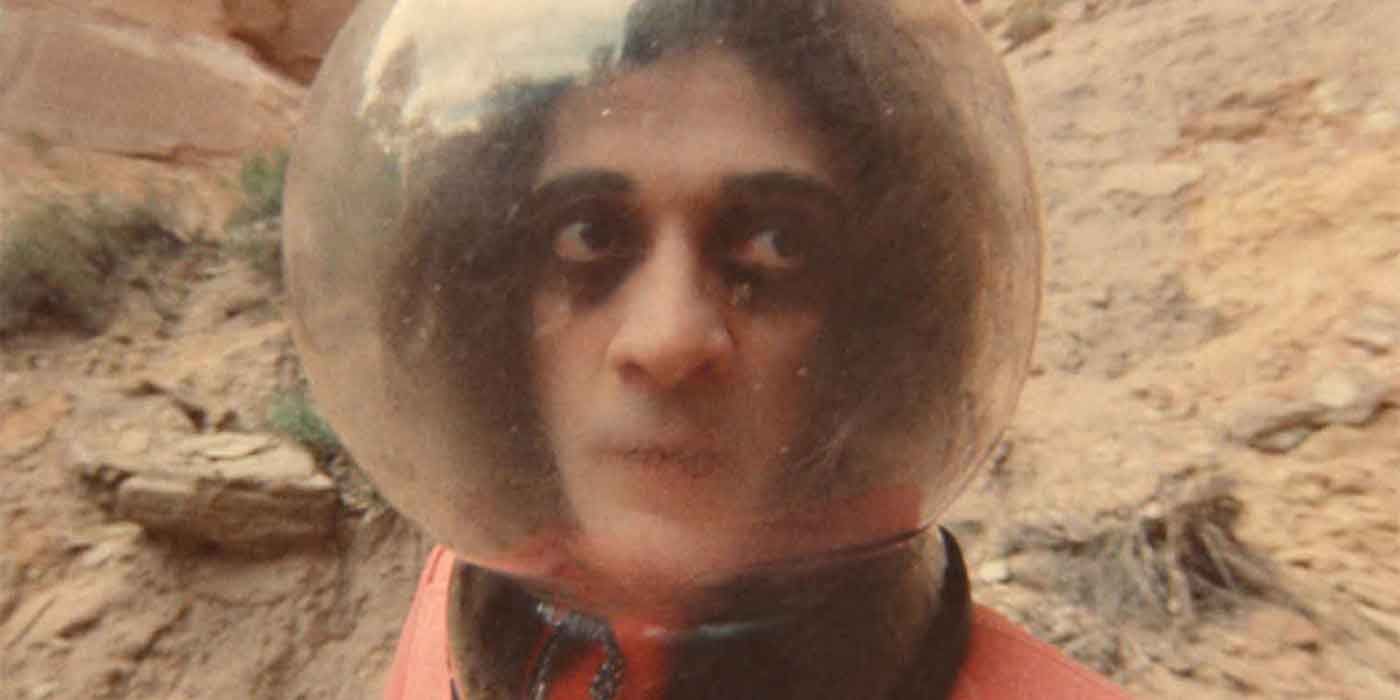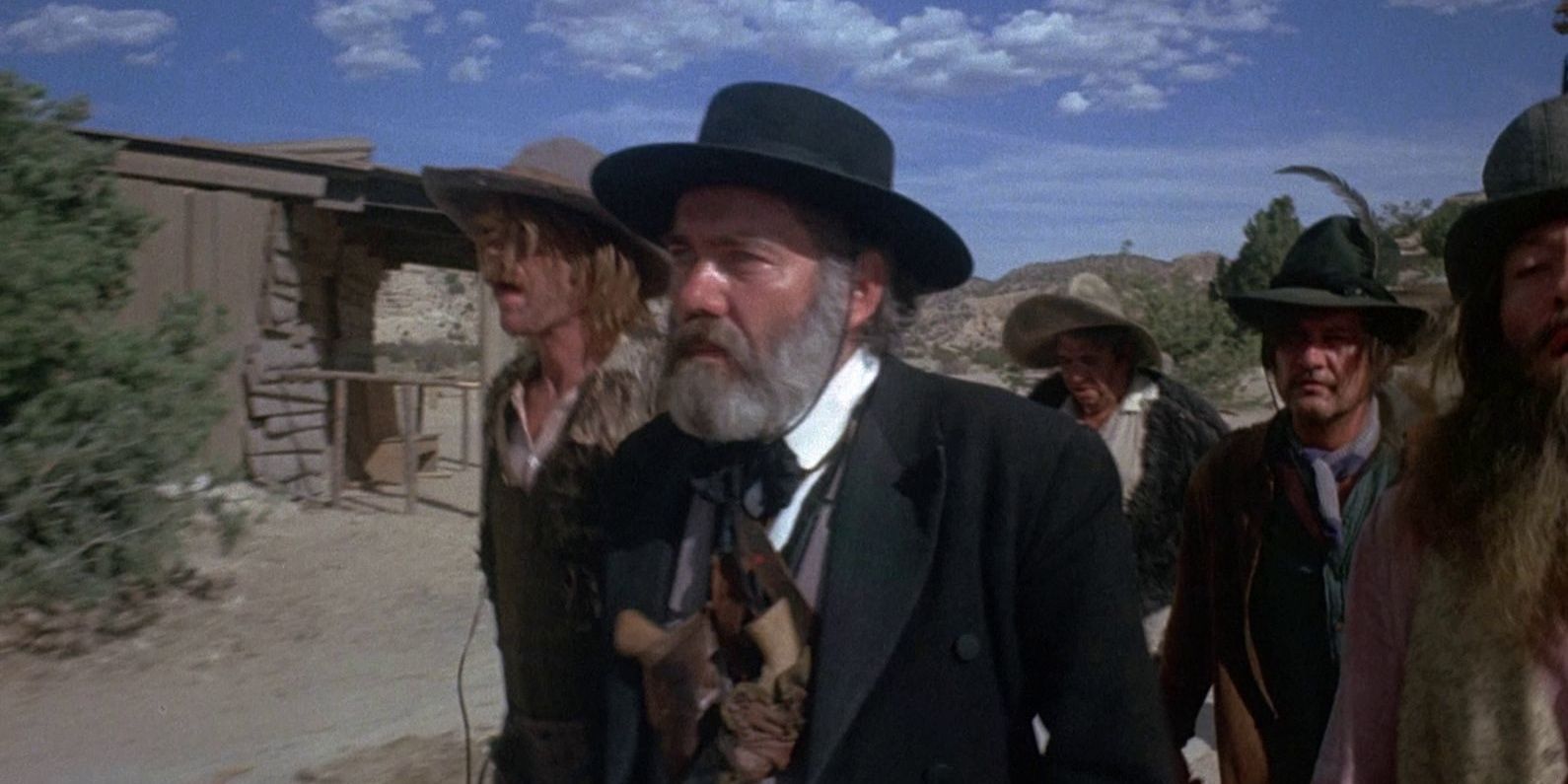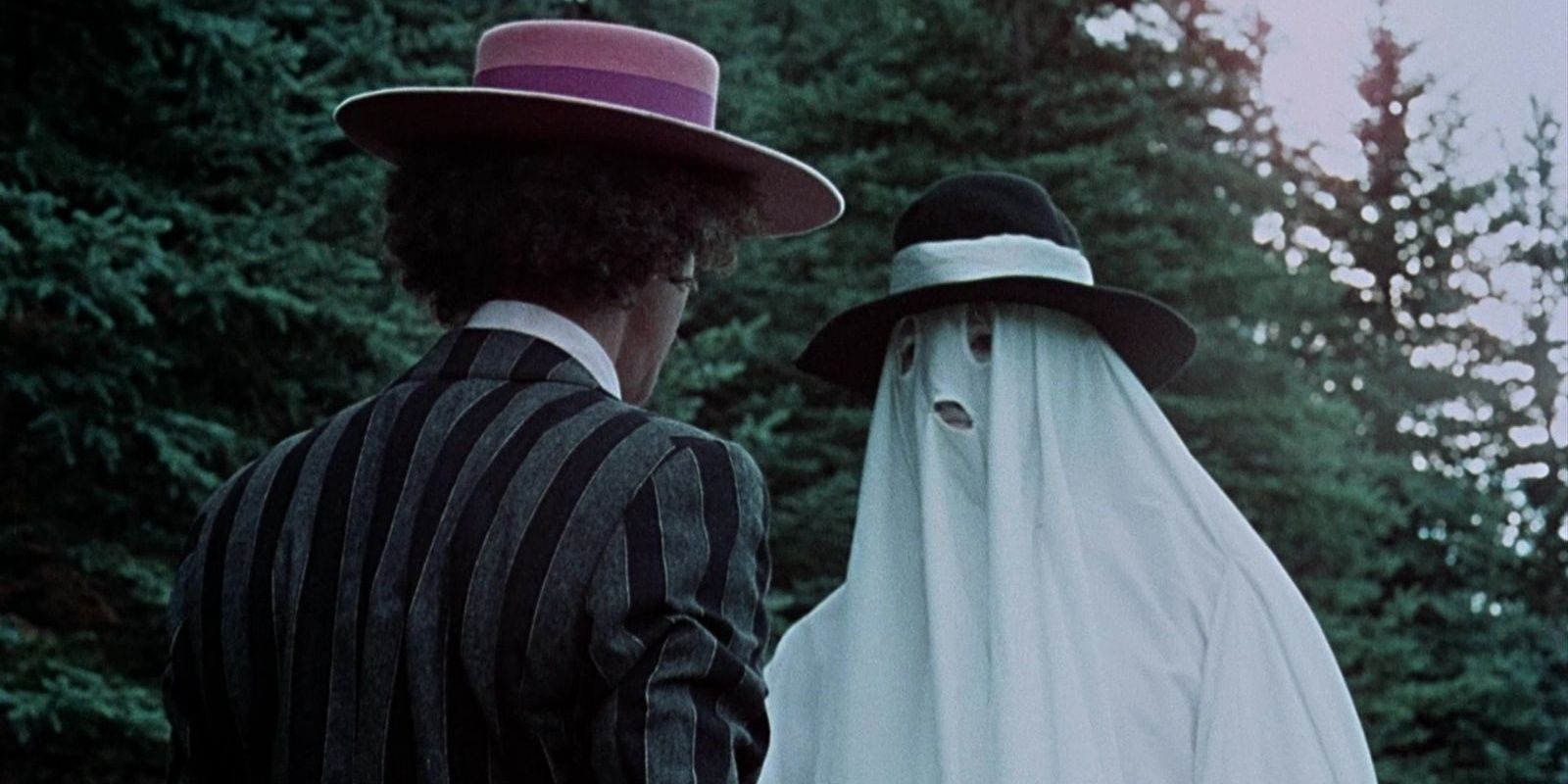Have you ever watched a classic Western and thought "This is great, but it's missing Jesus doing jazz hands"? Well if so, then have we got the movie for you! Some movies seem to exist outside of the usual paradigm of film criticism. Instead, their value rests on how strange or otherworldly they are, and how successfully they create in us a feeling or a tone that we didn't even know existed. Acid Westerns do this quite well and oftentimes evoke the contradictory feeling of alienation in the familiar. The 1972 film Greaser's Palace directed by Robert Downey Sr. does this quite effectively, though the whole point of the film remains vague at best. Regardless, it is an interesting entry in an interesting subgenre during the peak of cinema's existential break from normalcy during the late '60s and early '70s.
What Is 'Greaser's Palace' About?
Greaser's Palace follows the journey of Jesse (Allan Arbus) as he travels throughout the American frontier on his way to Jerusalem to follow his dream of being a famous dancer and singer. On his way, he stops in a town that has been taken over by Seaweedhead Greaser (Albert Henderson), a merciless tyrant who terrorizes the residents and imposes exorbitant taxes on them. In one of the earliest examples of Seaweedhead's reign of terror, he shoots his own son Lamy Homo (Michael Sullivan) in the chest multiple times for interrupting his daughter Cholera's (Luana Anders) erotic dance routine at the saloon. Jesse, dressed to the nines in a purple suit with white gloves and looking as if he could bust out into a show tune at any second, goes around healing people and raising the dead (including Lamy) with the super groovy maxim "if you feel, you heal". Jesse soon gains quite a healthy following, most of whom have migrated away from Greaser's tight grip.
What Are the Similarities Between 'Greaser's Palace' & 'El Topo'?
While the plot and tone of Greaser's Palace are undeniably absurd, unavoidable comparisons can be made between it and Alejandro Jodorosky's El Topo, the counterculture classic which came out a mere two years prior. The film even beats Jodorowsky to the punch with a subversive and satirical take on the Jesus Christ narrative one year before the celebrated surrealist would release his magnum opus The Holy Mountain. While Greaser's Palace is in no way as meteoric of a film as El Topo, it shares much of the same DNA, even when one looks past the surface-level similarities.
Both films are obviously alternative takes on the Western with pseudo-spiritual leanings, but the irreverence with which it handles those leanings is really where the similarities get interesting. Both films have characters that are in effect less so characters in themselves and more so broad archetypes that question the validity of social authority. The Christ figure in Greaser's Palace is surprisingly not very spiritual, especially when compared to many of the characters in Jodorowsky's films. He is an aimless traveler with the paper-thin motives of reaching stardom and success, not a wise guru and even less so a messiah. Even in Jodorowsky's The Holy Mountain, the Christ figure is on some sort of spiritual journey, even if it is not the one that we are used to seeing. It's a bold interpretation of Jesus Christ, as though religion is often satirized, there are still very few examples of Jesus himself being the target.
Greaser's Palace is much more straightforward in its satire than El Topo, yet the movie's point is either impenetrable upon first viewing or unsuccessfully communicated. The audience is left with the question "What if Jesus was a lowly magician who for no greater reason had supernatural abilities", but the film, unfortunately, doesn't delve any further. Still, it is an interesting concept and one seldom if ever tackled on screen.
'Greaser's Palace' Has Vague Spiritual Leanings
Greaser's Palace is clearly commentating on religion, specifically Christianity, by way of the townspeople blindingly following Jesse. As previously mentioned, the portrayal of Christ here is that of a cheap trickster who passively wanders through town, seemingly healing people at random with little to no agency. Jesse goes on to tap dance on water and perform other variations of well-known biblical miracles. He is clearly seen by the people as a savior, though he never gives any indication that that is his intention. He simply wanders through the town, bestowing blessings upon them. The townspeople seemingly never stop to ask where or from whom he has received these abilities, they just take them at face value and go from there.
There is also a caricature of the Holy Spirit, played humorously by a man in a white sheet ghost costume. While these interpretations of God are amusing at first glance, they don't seem to be given much thought beyond the initial shock of seeing these figures in such an irreverent light. Whether the film is going strictly for a more farcical humorous tone or whether it's trying to make more substantial critiques of religion isn't clear. What is clear is that Greaser's Palace has some beef with organized religion, specifically Christianity, but we're never told what that is. Is it that people follow religion blindly without digging deeper into the what, why, or how of their beliefs? Or is it satirizing the way that much of modern Christianity has simply become a form of frivolous entertainment? There are threads of both, but neither is examined further. The film however remains worthy of discussion simply by being so audacious as to treat such Christian symbols with irreverence.
Despite a relatively middling reception, the film did have its champions upon release, most notably Time's Jay Cocks who considered it Robert Downey's "funniest, most accomplished and most audacious film yet". Downey was known in the 70s for his satirical comedies, most notably Putney Swope from 1969 which became a cult classic, and Greaser's Palace fits neatly into his body of work as well as remaining a curiosity in its own right. One can only imagine that it is far more interesting now than it was when it was released, as the themes that it at least attempts to tackle are still highly taboo.
Even if its intentions are never made clear, the film feels unequivocally modern in the way that it mixes spiritual pondering, social satire, physical comedy, absurdism, and even scatological humor. There are films today that aim to achieve similar things, such as Swiss Army Man or Sorry to Bother You to varying degrees of success. Sometimes what makes a movie interesting though, is not in how well it succeeds, but how and why it fails. At the end of the day, Greaser's Palace is an interesting experiment that pushed the boundaries of what was acceptable in American film, even if no one was paying attention.



